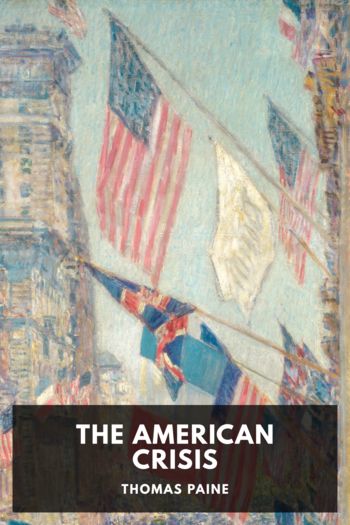Short Fiction, Vladimir Korolenko [finding audrey TXT] 📗

- Author: Vladimir Korolenko
Book online «Short Fiction, Vladimir Korolenko [finding audrey TXT] 📗». Author Vladimir Korolenko
I was especially surprised by one icon, of a crucifix painted on the cubical base. It was not old or had perhaps been renewed and it might well have been a piece of individual workmanship inspired by the sadness of this place. On a semicircular hill with no attempt at perspective could be seen a severed hand with compressed fingers. Beside it were huge nails. Hammer and saw were hanging in the air. Fragments of chains. … A column with a bundle of rods and whips fastened to it were painted against a background of whirling clouds. But a faint light pierced the clouds and penetrated the mists like a faint gleam of hope. And as if to emphasize this idea more clearly, the artist had depicted a cock greeting the sunrise. … On the top of the column the bird was standing with vibrating wings and open beak, welcoming the morning. …
Silently we left the chapel. Although the interior was not dark—yet it seemed to me that in passing out through this low door we were passing from deep gloom into the light of a clear sky.
Directly ahead of me little heads of grain waved their brilliant wings as if they were alive. The churches and monasteries of Arzamas, like lace, gleamed on the neighboring mountain. The Vyyezdnaya Sloboda with its little church looked down beautifully into the Tesha.
“Oh, God,” sighed one of the peasants deeply and slowly.
What did this sigh express? I do not know. Was it a consciousness of the difficult conditions of life for the workingmen at this present time? Or was it a feeling that, no matter how hard conditions were now, yet it was better to live in the present than in the gloomy night of the past? … I thought it was the second idea.
We parted and each went his own way.
EndnotesThe Spirit of the Woods. —A. D. ↩
On Easter night a part of the ceremony of the Greek Church consists in the carrying of crosses and banners by the clergy around the outside of the church, in commemoration of the seeking of the body of Christ by Joseph of Arimathea. —A. D. ↩
Siberian hut. Many of the Russian exiles adopt the winter expedients of the Yakuts or inhabitants of Yakutsk. —A. D. ↩
Elder of convict unions. —A. D. ↩
“Vagrant,” or “vagabond” is the name given to escaped convicts who “tramp” their way through Siberia back to Europe. —A. D. ↩
A pood, or pud, is thirty-six pounds avoirdupois. —A. D. ↩
A tributary of the Lena. —A. D. ↩
To “make a cover” means, in the convict dialect, to kill a man inside the prison-walls. A long, loose coat worn by the convicts is generally thrown over the head of the victim, in order to deaden his cries. This is called “making a cover.” —V. K. ↩
A Russian proverb. —A. D. ↩
Peril. —A. D. ↩
About three-quarters of a yard. —A. D. ↩
Russian proverb. —A. D. ↩
To wish one a long life means that the person from whom the wish is supposed to come is dead. —A. D. ↩
The district chief of police. —A. D. ↩
A “Free Company” is composed of convicts who have served their sentence. They no longer live in prison, but are quartered in the town, though both their labor and their persons are still under a certain control, and they are subjected to rules and regulations. —V. K. ↩
By the Réaumur thermometer, used throughout Russia. —A. D. ↩
A Tartar headdress. —V. K. ↩
Liquor traffic is strictly forbidden at the goldmines or in their immediate vicinity; consequently, about the tributaries of the Lena, where the mines are situated, an unlawful business has sprung up, that of carrying spirits to the miners, who exchange for it gold. This is dangerous traffic, for, if caught, one is sentenced to hard labor, and, in this locality, it is carried on under many and great difficulties. Some carriers perish in the forest from privations, some are shot down by Cossacks, others die by the hands of their own comrades; but, to compensate for all this, the profit is enormous, much more than a man could make by mining. —V. K. ↩
A team with three horses harnessed abreast. —A. D. ↩
A long, open cart without springs. —A. D. ↩
An instrument resembling a three-stringed lute. —A. D. ↩
A covered vehicle used in Siberia. —A. D. ↩
A diminutive of Constantine. —A. D. ↩
Name given to drivers of private conveyances in Siberia. —A. D. ↩
A religious sect of vegetarians. —A. D. ↩
A wooden arch that rises over the head of the middle horse, and to which a bell is fastened. —A. D. ↩
Believers of the Old Faith. —A. D. ↩
Chief of police of a district. —A. D. ↩
A two-wheeled vehicle. —A. D. ↩
The rural authorities. —





Comments (0)